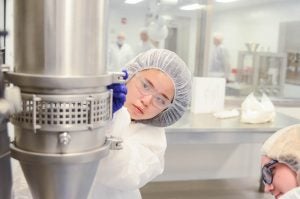College of Pharmacy’s Pharmaceutical Development Institute plays key role in trial
“Keeping this study in Rhode Island was important to us,” said Paula Grammas, Ph.D., executive director of the Ryan Institute. “This state has a world-class and closely-linked community of researchers and clinicians, which enables us to pull together resources and make progress quickly.”In a pioneering clinical trial that will attack Alzheimer’s disease by targeting inflammation in the brain’s blood vessels, researchers at the George & Anne Ryan Institute for Neuroscience have received regulatory approval to initiate the BEACON Study. This URI-sponsored study is the first-ever clinical trial led and conducted entirely within the state designed to treat individuals with mild cognitive impairment probably due to Alzheimer’s disease and those diagnosed with mild Alzheimer’s disease. Alzheimer’s research clinics at Rhode Island Hospital, Rhode Island Mood and Memory Research Institute, and Butler Hospital will be enrolling participants later this year for this uniquely Rhode Island study.
The study is funded through a grant from the Alzheimer’s Drug Discovery Foundation (ADDF) along with private donations. The ADDF catalyzes and funds drug discovery and drug development for Alzheimer’s disease and related disorders. This research is also made possible by an independent grant from Boehringer Ingelheim Pharmaceuticals, Inc., which is providing the active drug for this study, dabigatran. URI’s Pharmaceutical Development Institute is providing the placebo comparator for this trial.
“The role of the vasculature in Alzheimer’s disease has been grossly under-recognized until relatively recently,” said Dr. Howard Fillit, Founding Executive Director and Chief Science Officer of the Alzheimer’s Drug Discovery Foundation. “As a result, strategies to develop therapeutics to address this important part of the disease have been lacking. We are pleased to work with Dr. Grammas and fund her work using a very novel approach to repurpose an existing drug to treat the vascular abnormalities in Alzheimer’s disease.”
Decades of clinical trials have brought no treatments that slow or stop Alzheimer’s disease, and only a few have been approved to treat its symptoms. Most of these studies have targeted amyloid-beta, a protein which accumulates in the brains of patients. The lack of successful trials targeting amyloid has caused some researchers, including Grammas, to study whether targeting other possible causes of the disease could be a productive approach.
BEACON is a Phase I clinical trial that looks into the possible role of the brain’s blood vessels in Alzheimer’s disease. Grammas’s research has shown that factors such as high blood pressure, diabetes, and stroke can injure blood vessels in the brain, resulting in inflammation that could cause the damage or death of brain cells that occurs in Alzheimer’s disease. The BEACON Study repurposes an existing drug, dabigatran, FDA-approved to reduce the risk of stroke and systemic embolism in patients with non-valvular atrial fibrillation and for the treatment and to reduce the risk of reoccurrence of deep venous thrombosis and pulmonary embolism, to suppress one part of the inflammation process associated with Alzheimer’s disease. Results from the BEACON Study are expected in late 2020.
“If the drug shows some effects on the progression of Alzheimer’s disease, it would be the first time we’ve found evidence of a treatment that could slow the disease,” says Grammas. “But even if the study’s results are less conclusive, this is a vitally important step forward in expanding our knowledge of the multiple factors that cause this complex disease. I’m very excited to see what happens.”
Innovative Approach Uses Existing Drug to Target Inflammation in Brain Blood Vessels
Alzheimer’s disease is one of the most pressing global health challenges. 5.2 million Americans are affected by the disease, with costs of care estimated to be $259 billion in 2017. While there are medications to address some of the symptoms of Alzheimer’s, there are currently no approved treatments that can prevent, slow, or cure the disease. Meanwhile, despite decades of research, many of the factors that are likely to play a role in Alzheimer’s disease, such as inflammation, the immune system, and the brain’s vasculature, have remained largely under-explored. The Ryan Institute (ryaninstitute.uri.edu) has been a leader in investigating these critical factors.
The BEACON Study is based on 30 years of research by Dr. Grammas and her team. They were the first to identify an inflammatory cascade in which injury to the cells lining blood vessels in the brain (known as endothelial cells) “activates” them, causing the release of a number of different molecules harmful or toxic to nerve cells. Grammas’s research has shown that thrombin, a protein involved in blood clotting, may be a key driver in this process. The BEACON Study will look at the effects of the drug dabigatran, a direct thrombin inhibitor, to slow down this harmful cascade in the early stages of Alzheimer’s disease. In preclinical studies using rodent models of Alzheimer’s disease, the treatment significantly slowed neurodegeneration, and drugs with similar action slowed the decline of cognitive function. BEACON stands for “Blocking Endothelial Activation to Curb the Onset of Neurodegeneration.”
How to Learn More About Participating
If you are in good health, between 50 and 85 years old, and interested in learning more, please contact the BEACON Study information line at (401) 874-5650 or email us at beaconstudy@uri.edu.
The Alzheimer’s Drug Discovery Foundation
Founded in 1998 by Leonard A. and Ronald S. Lauder, the Alzheimer’s Drug Discovery Foundation is dedicated to rapidly accelerating the discovery of drugs to prevent, treat and cure Alzheimer’s disease. The ADDF is the only public charity solely focused on funding the development of drugs for Alzheimer’s, employing a venture philanthropy model to support research in academia and the biotech industry. Through the generosity of its donors, the ADDF has awarded over $100 million to fund more than 500 Alzheimer’s drug discovery programs and clinical trials in 18 countries. To learn more, please visit http://www.alzdiscovery.org/.

